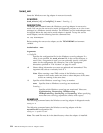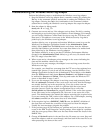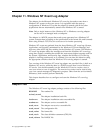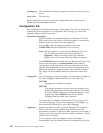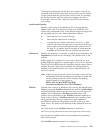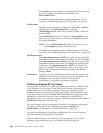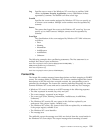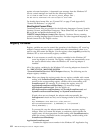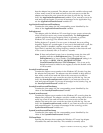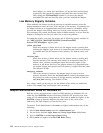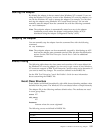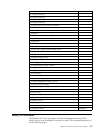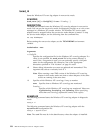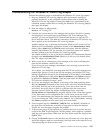
against a format description. A formatted error message from the Windows NT
service control manager can look like the following example:
Jan 15 15:06:19 1998 0 Error N/A Service_Control_Manager 7024 \
The UPS service terminated with service-specific error 2481.
For details about format files, see “Format File” on page 17 and Appendix B,
“Format File Reference” on page 145.
Non-English Format Files
Translated format files are provided for the following languages: German, Spanish,
Japanese, Korean, and Brazilian Portuguese. These format files are located in the
de, es, ja, ko, and pt_Br subdirectories of the
TME/TEC/samples/adapter_format_files directory. Use these files as a starting
point for creating language-specific format files. For other supported languages, the
default format file is the English version.
Registry Variables
Registry variables are used to control the operation of the Windows NT event log
adapter. Changes made to registry variables take effect immediately; there is no
need to stop and restart the adapter. Use the registry editor (regedt32) provided by
Windows NT to view and modify registry variables.
Note: It is not necessary to modify the registry variables for the Windows NT
event log adapter to function. The registry variables are automatically set to
the correct default values when the Windows NT event log adapter is
installed.
All of the registry variables for the Windows NT event log adapter are located in
the \HKEY_LOCAL_MACHINE\SYSTEM
\CurrentControlSet\Services\TECNTAdapter directory. The following are the
adapter registry variables:
Note: When you change the registry entries for any registry variable with a name
ending with EventsProcessedTimeStamp, you must also change the registry
entries for the corresponding registry variable with a name ending with
EventsProcessed. For example, if you change the registry entry for
ApplicationEventsProcessedTimeStamp, you must also change
ApplicationEventsProcessed. This also applies to
SecurityEventsProcessedTimeStamp and SecurityEventsProcessed, and
SystemEventsProcessedTimeStamp and SystemEventsProcessed.
If both values are not changed, the adapter ends unexpectedly, the
PollingInterval criteria are met, and a message similar to the following is
sent:
msg=’TECNTAdapter shuts down.Error: older event on \
ApplicationEventsProcessed : (1,920433843) vs last processed \
event(1,923673952).’;
To prevent this, stop the adapter and then make the necessary registry
changes. When you restart the adapter, a consistency check updates the
registry entry for the appropriate variable ending with EventsProcessed to
match the correct value based on the corresponding variable ending with
EventsProcessedTimeStamp.
ApplicationEventsProcessed
Contains the highest event number in the Windows NT Application Log
132 IBM Tivoli Enterprise Console: Adapters Guide



